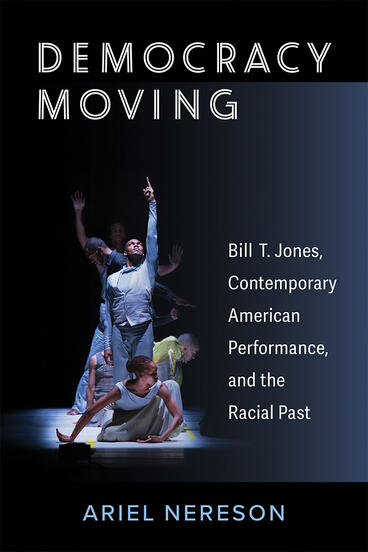Democracy Moving
Bill T. Jones, Contemporary American Performance, and the Racial Past
Explores the potential of movement to create and revise historical narratives of race and nation
Description
On the 200th anniversary of Abraham Lincoln’s birth, renowned choreographer and director Bill T. Jones developed three tributes: Serenade/The Proposition, 100 Migrations, and Fondly Do We Hope . . . Fervently Do We Pray. These widely acclaimed dance works incorporated video and audio text from Lincoln’s writings as they examined key moments in his life and his enduring legacy. Democracy Moving explores how these works provided both an occasion and a method by which democracy and history might be reconceived through movement, positioning dance as a form of both history and historiography.
The project addresses how different communities choose to commemorate historical figures, events, and places through art—whether performance, oratory, song, statuary, or portraiture—and in particular, Black US American counter-memorial practices that address histories of slavery. Advancing the theory of oscillation as Black aesthetic praxis, author Ariel Nereson celebrates Bill T. Jones as a public intellectual whose practice has contributed to the project of understanding America’s relationship to its troubled past. The book features materials from Bill T. Jones/Arnie Zane Company’s largely unexplored archive, interviews with artists, and photos that document this critical stage of Jones’s career as it explores how aesthetics, as ideas in action, can imagine more just and equitable social formations.
Ariel Nereson is Assistant Professor of Dance Studies, University at Buffalo.
Reviews
“Nereson’s navigation of the relationship between the kinesthetic ordering of movement and the narrative ordering of the past in Jones’s work is compelling. The focus into his Abraham Lincoln works from 2006–2013 allows her to deeply analyze the artistry using sophisticated critical theory at the site of race, gender, and sexuality while indicating the importance of and implications for Jones’s other works.” – Nadine George-Graves, Northwestern University
- Nadine George-Graves
“An outstanding scholarly work, Nereson’s book synthesizes perspectives from Critical Race Studies, Dance, and Performance Studies to show how dance-making can put forward an argument about the historical past. Through vivid and compelling analyses of specific pieces, Nereson makes a very important contribution to our understanding of late twentieth and twenty-first century performance, African American identity, and the complex relationships between past and present.” – Susan Leigh Foster, University of California, Los Angeles
- Susan Leigh Foster
“Nereson is forthright in articulating how whiteness informs even the lens through which this text was written. Drawing extensively on dance historiography, this book is likely to be particularly valuable for those with a strong foundation in the history of dance or the US racial past. Highly recommended.”
- CHOICE
—CHOICE
"Nereson beautifully discusses the work of Bill T. Jones through the classical lenses of dance and performance studies. . . Overall, Democracy Moving represents a valuable discussion of an important Black artist and his work, ensuring for him a warranted place in the (astoundingly white) canon of dance, theatre, and performance studies."
- Jazelynn Goudy
—New England Theatre Journal
Honorable Mention: American Theatre and Drama Society (ATDS) 2023 John W. Frick Book Award
- ATDS John W. Frick Book Award
"Democracy Moving is eye-opening, not only for scholars and arts administrators, but also for teachers of dance history. Ironically, a book about dances made at the height of post-racial optimism has perhaps even more to teach us now, in the backlash against it."
- Rachel Carrico
--Dance Chronicle
News, Reviews, Interviews
Read: Named a Notable Dance Book of 2022 by Wendy Perron | 12/04/2022
Finalist: American Society for Theatre Research Barnard Hewitt Award for Outstanding Research in Theatre History | 02/08/2024

